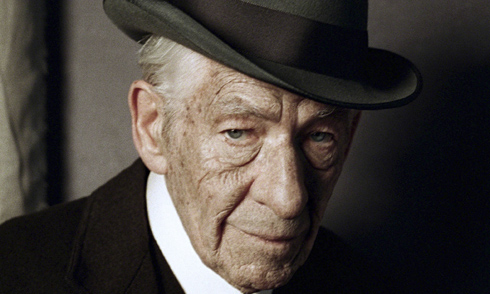Sherlock Holmes has been adapted countless times on stage and screen since his first appearance more than a hundred years ago. But what if the Holmes that we know in popular culture, a Holmes filtered through the fanciful eyes of Dr. Watson, has been exaggerated? In Mr. Holmes, we see a very different version of the famed detective. Based on Mitch Cullin’s novel, A Slight Trick of the Mind, the film gives us an aged Holmes (Ian McKellen), physically frail and becoming senile. Watson is dead, and Holmes no longer accepts cases. Now, he feels compelled to solve the mystery of his last case, which he can no longer remember.
This is a quiet movie, more concerned with day-to-day life than the flash and glamour typically associated with Holmes. It’s 1947, and he lives alone in his countryside home with a housekeeper and widow (Laura Linney) and her 14-year-old son, Roger. Now only two things drive him: his beloved bees and his desire to unravel the difference between truth and fantasy in his last case 30 years earlier, “The Lady in Grey.” Dr. Watson had written a book about it, but Holmes feels sure that the author got it wrong. Watson supplied a happy ending, and Holmes knows that it could not have ended well in real life. He asks Roger that if he had actually solved the matter, why would he have chosen to retire immediately after?
Throughout, the film examines the difference between hard truth and comforting fiction. The Holmes of this world does not use a pipe or wear a hat like the figure that Watson invented in the books. Holmes is quick to disappoint his admirers by revealing that the sleuth of popular fiction is just a myth. “I think I was real once, before John wrote me down,” he says at one point.
At first, the facts seem cut and dry. However, his investigation leads him to question his beliefs. In a flashback, a husband asks Holmes to look into his wife Ann’s glass harmonica teacher, whom he suspects is swindling his wife with false talk of spirits. (The glass harmonica is played by touching a series of moving glass bowls, producing an eerie sound.) Later, the wife is killed. Watson attributes the murder to the instructor, but Holmes is sure that the ending is too neat to be true. By examining his own memory, and with the help of his protégé Roger, Holmes discovers that there is more to the mystery than Watson’s story, and more to human nature than he had imagined.
Slow in pace and rich in nuance, Mr. Holmes might not be what most audiences would expect from a mystery film. It has a melancholic tone and is internally driven. Ann’s mystery is not solved by clues alone: Holmes must understand her pain and suffering as well. The film’s power is subtle, carried by strong acting and writing rather than by gimmicks. The script feels natural: it easily balances between death and comedy, plowing through complex storylines with grace. The supporting characters are impeccably cast, with a standout performance by Milo Parker as Roger. McKellen instills the dying, senile Holmes with dignity, capturing his failing health and memory but never allowing his character to be reduced to a cliché.
Director Bill Condon has done a lovely job of bringing this novel to the screen. The film is enriched by beautiful camera work and the occasional perfectly placed witty line of dialogue. Everything about Mr. Holmes feels artful and intentional, but never forced.







Leave A Comment